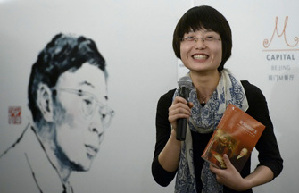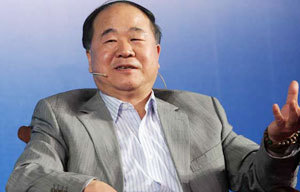"In addition, he was a professor of philosophy. He was used to using big terms - and Latin words - and once he said something about 'hiatus'. I will never forget this. Many new words I could guess from the context, but when he said there was a hiatus in relations between the then Soviet Union and the United States, I was thinking 'What is hiatus?' I didn't know.
"So I just had to ask: 'What is hiatus?'"
He looked at me and said: "Pause."
In 1975, she was called back to Beijing to act as interpreter for Chinese leaders, mainly for talks between Chinese leaders and Americans - officials, congressmen and scholars.
"So I had a lot of opportunities to interpret for Henry Kissinger," she says, smiling.
In 1977, when Deng Xiaoping assumed official duties for the third time, she says, she gradually became his interpreter.
"He was a man who looked very serious," she says. "He was hard of hearing, so he didn't say much, but sometimes he would be very humorous.
"For instance, in Singapore, once we had a meal together - not a banquet - before we left. He asked for some chilies, very small chilies - very hot - and then he said he would like to give me some. I said no, I couldn't eat chilies; they are too hot, not good for my throat or my voice.
"Then he teased me, he said 'You must eat some chilies, some hot things - otherwise you are not a revolutionary!'"
At one state banquet, a protocol official had seated her at the back of the room.
"I must sit at the head table to do my work. So I had a chair put behind the host and Deng Xiaoping, and, of course, I didn't get anything to eat. And he turned back and said, 'Oh, Xiao Shi, you don't have anything to eat!'"
I said: "It doesn't matter."
Deng gave her his bread, saying: "Take this. Don't get too hungry."
On a trip to Nepal, at a very big meeting with an open-air welcome, she remembers people giving him a black Nepalese hat.
"He looked very happy, but it was a little bit hot. Usually he didn't wear a hat, so the security man asked him to take it off, but he said: 'No! Why? It's very good!' And so he wore the hat throughout the whole of the welcome, which lasted more than one hour."
This showed he had respect for other people's customs, she says.
"In 1979, when he put on the cowboy's hat in Texas and was smiling, the American people were also very happy. The Chinese people were very surprised," she says.
In past propaganda the cowboy image was a bad thing - so American.
"So to have our leader Deng Xiaoping put on the cowboy hat - this was something wonderful," she says.
|
 |
 |
| Translators act as bridge between China and France | Translators need to strike a balance |
|
|
|
|
|
|
|
|
